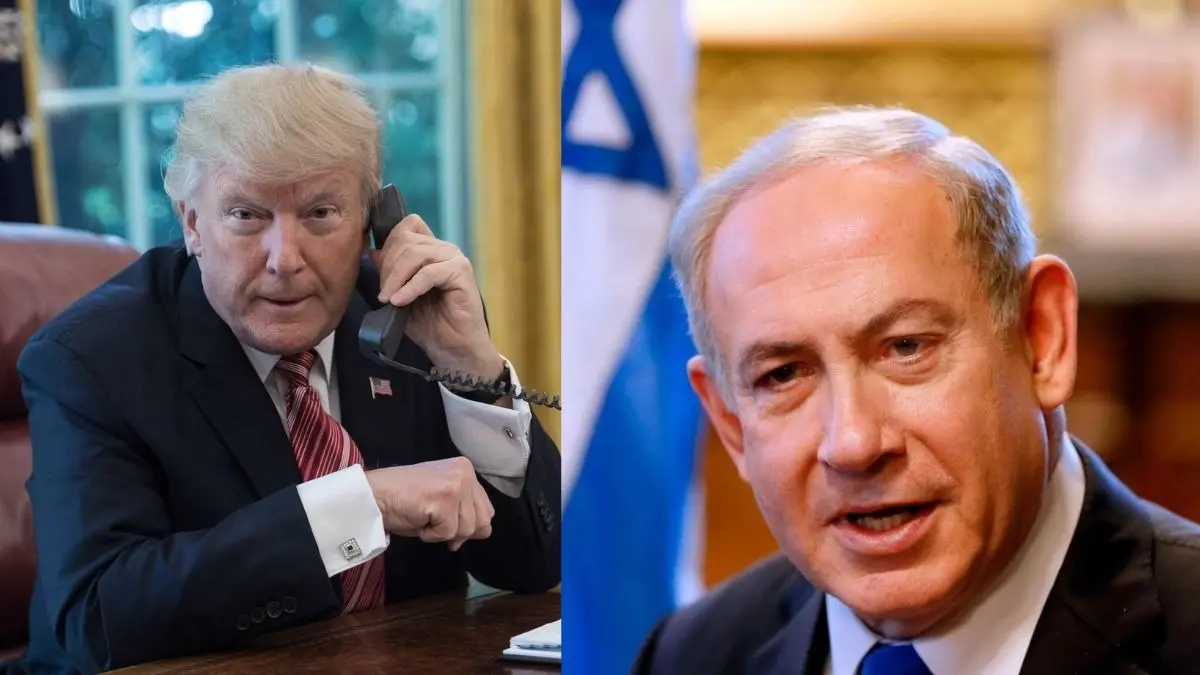Updated 25 June 2025 at 02:16 IST
Donald Trump Tells Benjamin Netanyahu, US Won't Pursue Further Military Action Against Iran
Fragile ceasefire between Iran and Israel holds amid Donald Trump's frustration. Israel and Iran exchange accusations over ceasefire violations.
- World News
- 4 min read

Washington: Hours after expressing discontent over ceasefire violations, US President Donald Trump has informed Israeli Prime Minister Benjamin Netanyahu that the United States will not pursue further offensive military action against Iran following Sunday's airstrikes on three key Iranian nuclear sites. According to a senior White House official, Trump told Netanyahu that it was time to halt the war and shift back to diplomacy, conveying that the strikes had neutralised the immediate threat from Iran.
As per the officials, the US president's position is that the airstrikes had removed any imminent threat posed by Iran, and the US has no intention of deepening its military involvement. Netanyahu reportedly understood Trump's stance, acknowledging that Washington was not seeking continued engagement in the conflict. Amidst the escalating tensions between Israel and Iran in recent days, the development came as a surprise to many.
The conflict began when Israel targeted Iranian nuclear and military sites, citing concerns about Tehran's nuclear ambitions. Iran maintained that its program is peaceful, but Israel feared the Islamic Republic was close to developing atomic weapons. The US intervened, dropping bunker-buster bombs on Iranian nuclear sites over the weekend, a move that risked further destabilising the volatile region.
However, following the US strikes, Trump told Netanyahu not to expect further American offensive military action. "It's time to stop the war and return to diplomatic negotiations," Trump reportedly told Netanyahu. The US president's position is that the strikes had neutralised the immediate threat from Iran, and the US had no desire to be further involved militarily.
Advertisement
Israel-Iran Fragile Peace
A fragile ceasefire between Iran and Israel appeared to hold on Tuesday after initially faltering, with Trump expressing frustration with both sides. "They have fought for so long and so hard that they don't know what they're doing," he said, using an expletive to emphasise his point. Despite the rocky start, the US President announced that Israel had backed off its threat to attack Tehran and would turn its jets around.
Netanyahu's office confirmed that Israel struck an Iranian radar site in response to the Iranian missile attack early Tuesday, but Israeli forces held off on something bigger. "Israel refrained from additional attacks," Netanyahu's office said, following Trump's conversation with the Israeli prime minister. Netanyahu claimed that Israel's war had brought Iran's nuclear program "to ruin" in a historic victory, thanking Trump for the US bombing of the three nuclear sites.
Advertisement
The analysts welcomed the ceasefire between the two countries, deeming it crucial, given the possible economic impact of a protracted conflict and Iran's warning to close the Strait of Hormuz. If Iran were to close the Strait of Hormuz, a vital shipping channel, it could have far-reaching consequences for the global economy.
China, Iran's largest trading partner and only remaining oil customer, condemned the US attacks and expressed concern about a "spiral of escalations" without a ceasefire. Trump suggested that the ceasefire would allow Iranian oil to continue flowing, saying that China could keep purchasing crude from Iran.
Can The Ceasefire Hold?
The fragile ceasefire between Iran and Israel has been brokered by Trump, bringing a glimmer of hope to a region on the cusp of all-out war. The agreement, announced by the US President on social media, aimed to put an end to the 12-day conflict that has left both nations reeling. But what led to this point, and can the ceasefire hold?
Trump announced that Israel and Iran had agreed to a complete and total ceasefire, with both sides committing to refrain from further attacks. "ISRAEL is not going to attack Iran. All planes will turn around and head home, while doing a friendly 'Plane Wave' to Iran. Nobody will be hurt, the Ceasefire is in effect!" Trump said in a post on Truth Social.
Israeli Prime Minister Benjamin Netanyahu's office confirmed that Israel struck an Iranian radar site in response to the Iranian missile attack early on Tuesday, but Israeli forces held off on something bigger. Netanyahu said late Tuesday that Israel's war had brought Iran's nuclear program "to ruin" in a historic victory. "Israel took out top generals and nuclear scientists and destroyed nuclear facilities in Natanz, Isfahan and the Arak heavy water reactor," Netanyahu said, thanking Trump for the US bombing of the three nuclear sites.
Meanwhile, the sustainability of the ceasefire between Iran and Israel hangs in the balance as both nations claim victory and vow to retaliate forcefully if attacked. US President Donald Trump brokered a ceasefire, with an aim to halt the 12-day conflict, but the situation remains volatile.
Published By : Abhishek Tiwari
Published On: 25 June 2025 at 02:16 IST
